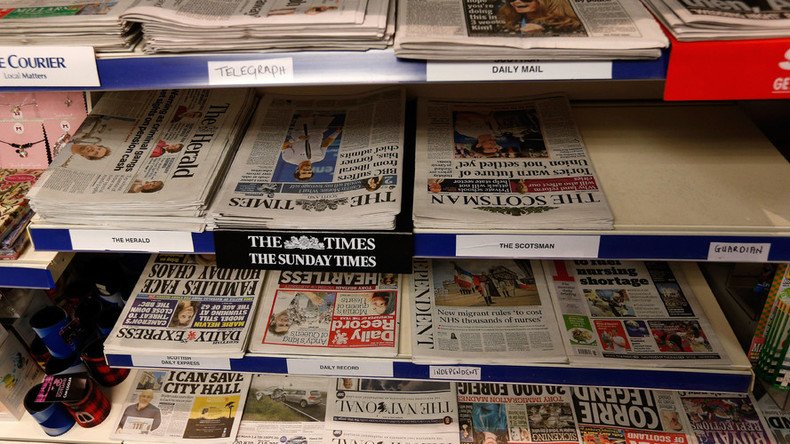‘Most right-wing in Europe’: British media lambasted in YouGov poll

Britain’s media landscape is perceived to be the most right-wing in Europe, framing immigration in a particularly negative light, a new poll suggests.
The survey, conducted by YouGov, examined the views of people from seven prominent states across Europe. Respondents came from Britain, France, Germany, Sweden, Norway, Denmark and Finland.
Right-wing media bias
Published on Monday, the poll asked participants whether they think their state’s media coverage of five key issues is too right-wing, left-wing or balanced. Policy areas examined were immigration, health, economics, housing and crime.
Between 25 percent and 33 percent of Brits think British media coverage of these issues is reasonably balanced. But a higher number are inclined to say it is “too right-wing.”
British press ‘most right-wing’ in Europe
— YouGov (@YouGov) February 7, 2016
https://t.co/FC6auGwpfbpic.twitter.com/QdpRLoQx1I
Some 26 percent regard British TV, radio and newspapers as “too right-wing,” more than any other nation polled. By contrast, 17 percent regard British media as “too left-wing.” A further 27 percent say Britain’s media coverage of economic issues is too right-wing, while 26 percent say UK coverage of housing is too conservative.
Similarly, 26 percent say media coverage of health issues is skewed to the right, while 23 percent say the same for crime.
On the subject of immigration and refugees, British respondents were particularly critical, with 29 percent saying UK media coverage of these topics is too right-wing.
According to the Media Reform Coalition, Corbyn was ‘systematically undermined’ and attacked by the British press... https://t.co/joCVA13wmX
— Damien Willey (@DamienWilley) January 8, 2016
Of all respondents that took part in the survey, only the Finns view their media coverage to be as right-wing as Britain’s. Some 23 percent of Finnish respondents say they perceive a right-wing bias in their media.
Media bias against Corbyn
UK campaign Media Reform Coalition (MRC) says media ownership relates closely to media bias. The group warns against media outlets’ monopolization of debate and a risk of undue influence on politicians.
It says that Jeremy Corbyn has been exposed to a high degree of right-wing media bias since becoming leader of the Labour Party. Right-wing framing was apparent in much coverage of his first week in power, according to the campaign.
A report conducted by the group, a revised version of which was published in early January, found that large sections of the British press had appeared to deliberately undermine the newly elected Labour chief after his landslide victory.
https://t.co/3YRWl4OjZM by Media Reform Coalition shows systematic attacks on Corbyn #firstweekafterelection
— parva est (@parvaest) January 2, 2016
The study examined coverage from eight national daily newspapers and their Sunday sister papers, which spanned 494 news, comment and editorial pieces. It found that 60 percent of the stories were framed in a negative manner, while 13 percent were perceived as positive and 27 percent were seen as neutral.
In the Murdoch-controlled Sun and Sun on Sunday, 32 out of 36 news stories were hostile to Corbyn, while 50 out of 52 in the Daily Mail and Mail on Sunday also gave negative coverage. Given these right-wing tabloids have the largest and second largest share of circulation in Britain, their agenda-setting influence is noteworthy, according to the MRC.
The group’s report also found that 100 percent of the editorials in the Sun, Mail and Express framed Corbyn’s first week as Labour leader in a negative light.
'Risk of undue political influence'
The study’s release followed remarks by Shadow Chancellor John McDonnell urging Labour to commit to reforming Britain’s media landscape, and examining how to break up existing concentrations of media ownership.
Chair of the MRC Dr Justin Schlosberg welcomed McDonnel’s comments at the time.
“In a democracy, newspapers have every right to take a partisan line, but what concerns us are the skewed ownership structures underlying this kind of political intervention,” he said.
“The risk of undue influence on elected politicians is high, and it is hard to see how democracy can flourish when the mass channels of debate are monopolized in this way.
“Let’s not forget that Jeremy Corbyn was elected leader of this country’s main opposition party by 250,000 people, which is 100,000 more than the number of people who elected David Cameron as leader of the Conservatives. It is surely a problem for all of us when newspaper owners are actively seeking to undermine a democratic mandate of that scale.”












